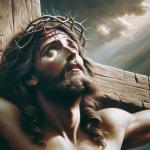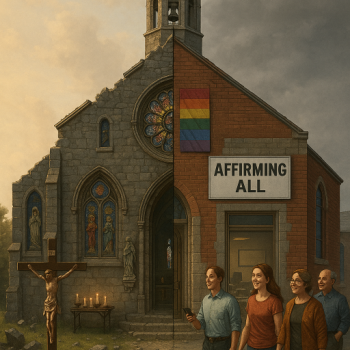***Happy Solemnity of the Assumption of the Blessed Virgin Mary!
The more I study my past Protestantism and dialogue with current Protestants, the more I realize the main appeal of Protestantism is religious autonomy. Now, Protestants will disagree with this assessment. Please, allow me to explain myself. Below, I layout two views on authority, infallibility notwithstanding, that demonstrate the Protestant appeal for religious autonomy. In short, the Protestant view of authority requires the use of their own religious autonomy. Conversely, the Catholics relinquish their religious autonomy to the Church (and here I include members of the Eastern, Russian, Coptic, and Oriental Orthodox Churches, as members of these rites also relinquish their religious autonomy).
Two Conversation Regarding Authority
Recently, I listened to two interviews, one of a Catholic convert from Protestantism, the other of a popular Protestant Youtuber/author. These interviews discussed different aspects of the role of religious autonomy in a Christian’s life.
The Catholic, Dr. Travis Lacy, made the following point about relinquishing his religious autonomy during his interview with Keith Nester. He stated:
Eventually what I realized was that I could always invent one new objection to Catholicism. Even if you solve the Mary issue, well then what about relics? Okay, let’s say you get over relics, okay then what about the papacy? You get over the papacy, well then what about indulgences? There’s always one more objection you can raise, unless you deal with a question of authority. If the church has the authority to infallibly interpret Scripture, then all of my objections to it become mute. [Emphasis added]
Conversely, the Protestant Dr. Gavin Ortlund, when discussing his recent book with Austin Suggs at Gospel Simplicity, made the following observation about taking up his religious own autonomy. He states:
If someone’s searching for an infallible authority, I would just say the Protestant schema is we have that in the word of God and we have that in the very stature of Jesus Christ Himself. He is the one we put at the top of the pyramid, and through His word and Spirit He governs the church. So yeah, we’ve got an infallible authority all right and every knee will bow before Him, but we don’t have ongoing mechanisms of infallibility in the church… [Emphasis added]
Notice that both Dr. Lacy and Dr. Ortlund, both highly educated individuals, deal with authority differently. One (Dr. Lacy) used his intellect and will to ultimately surrender his religious autonomy to the Church. The other (Dr. Ortlund) used his intellect and will to ultimately claim his own religious autonomy by appealing to Scripture (the word of God), knowing the mind of Jesus Christ “the top of the pyramid,” and “Spirit”, all of which require personal interpretation.
Protestant Autonomy Explained
Dr. Ortlund submits to no man or institution, not even his denomination. Raised a pedobaptist Presbyterian, Dr. Ortlund currently counts himself among those who only accept credobaptism—the Baptists. Sure, he claims to “submit” to his denominational religious authority, but this “submission” comes with the caveat that his denomination submits itself to the word of God (the Bible) and continues to accurately teach the mind of Christ through the Holy Spirit. Who determines if his denomination meets these criteria? Dr. Ortlund, of course! Now, Dr. Ortlund may claim, “hey, no matter where I go, I remain happily Protestant as long as I stay true to the word of God.” True. He remains firmly religiously autonomous. Any and all denominations must prove themselves faithful to his interpretation of the Bible and his understanding of the mind of Christ.
Catholic Submission Explained
Moreover, Dr. Lacey stands in opposition to Dr. Ortlund in his willful submission to the authority of the Catholic Church. Now, the issue of infallibility need not enter this specific discussion, as the current issue concerns submission to religious authority, not the nature of said authority. Like many converts to Catholicism, Dr. Lacy examined the history of the Church and determined the truth of its theological and biblical claims. Therefore, if the Church is what it claims, theological objections or full theological comprehension do not matter, only submission. Study? Yes. Read the Bible? Most certainly. Define doctrine/dogma? Never. At the end of the day, Catholics humbly set aside their self-appointed judges robes and submit to the authority established by Christ.
I highly recommend all readers (especially Protestants) watch/listen to the full interview.
Chalk On Protestant Autonomy and Catholic Submission
In his quintessential 2023 work on sola scripture, The Obscurity of Scripture: Disputing Sola Scriptura and the Protestant Notion of Biblical Perspicuity, Casey Chalk correctly explains Protestant autonomy as it relates to Scriptural perspicuity (clarity), which:
…gives the Protestant the ability to define and interpret the Bible, “submitting” to it through his own interpretation, and thus retaining his autonomy.
He juxtaposes this to the Catholic act of relinquishing autonomy.
In Catholicism, authority resides in the magisterium, who claim this power as the successor of Christ and His apostles, an authority which the Christian must recognize with an of faith. When the Catholic makes that act of faith, he relinquishes his autonomy to determine the content, parameters, and meaning of divine Revelation.
Here, Chalk perfectly summarizes the views of Dr. Lacy and Dr. Ortlund. Dr. Lacy, recognizing the authentic authority of the Church, submits himself to its understanding of divine revelation. On the other hand, Dr. Ortlund, in his interpretation of Scripture, retains his autonomy.
Is Catholic Submission Religious Autonomy by Another Name?
At this point, many Protestant readers may chime in with the critique that Catholic converts still make an autonomous choice to submit to the Church. They also claim that all Catholics must interpret Church teaching, so they too retain some level of religious autonomy. First, to lay down one’s religious autonomy as an autonomous act is a contradiction. Second, while Catholics must do their best to understand Church teaching, they possess no authority to change or amend it. Furthermore, with the Church possesses a living magisterium (current bishops and the pope)—Catholics receive real time clarifications in the form of official Church teaching documents, like encyclicals.
Don’t Cults Demand the Same?
Some defend religious autonomy by warning that surrendering one’s religious autonomy smacks of the cult. One Protestant friend I often dialogue with puts it this way:
I just don’t see how this is not perfect for cultic grounds. Submit your mind to the Church. Believe what they tell you to believe and don’t test what is being taught.
In a real sense, I agree with my friend, but only if the Church’s claims prove false. If the Church demands religious submission, and this demand rests on a lie, then yes, the Church is not better than a cult. However, if the claims prove true, all Christians must religiously submit to her out of obedience to Christ her founder. If one is convinced of the Church’s claims, any continued religious autonomy is due to pride and arrogance (or it seems so).
Final Thoughts….
In the above paragraphs, I demonstrate that religious autonomy represents THE foundational issue separating Protestants and Catholics. As Dr. Lacy stated, one can always invent objections to Catholicism and retain their religious autonomy. However, once convinced of the Church’s legitimate authority, all objections become mute. If the Church’s claims about herself prove true, all Christians must submit. If proven untrue, no Christian need take her seriously. In fact, they are justified in condemning her.
Finally, a word of wisdom to my Protestant friends… If you desire to disprove Catholicism, do not use the Bible. Informed Catholics understand this as mere private interpretation and the exercise of your religious autonomy. To disprove Catholicism, you must first disprove her historical claims.
A final word of warning: I once attempted to disprove the Church’s historical claims and ended up Catholic.
Thank you!
Read The Latin Right’s other writing here.
Please visit my Facebook page and IM your questions (and follow my page) or topics for articles you would like covered.
Also, please subscribe my YouTube page for updates on upcoming articles.













